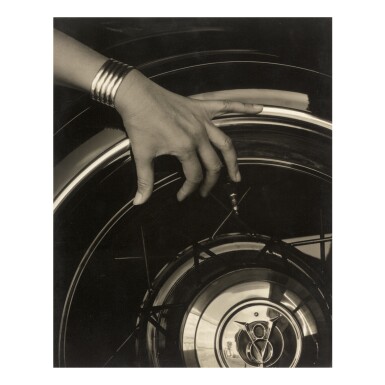Alfred Stieglitz, Georgia O’Keeffe, Juan Hamilton: Passage
Alfred Stieglitz, Georgia O’Keeffe, Juan Hamilton: Passage

ALFRED STIEGLITZ | GEORGIA O'KEEFFE - HAND AND WHEEL
Auction Closed
March 5, 05:19 PM GMT
Estimate
300,000 - 500,000 USD
Lot Details
Description
ALFRED STIEGLITZ
1864 - 1946
GEORGIA O'KEEFFE - HAND AND WHEEL
flush-mounted, mounted again to board
gelatin silver print
9 ½ by 7 ⅝ inches
(24.1 by 19.4 cm)
Executed in 1933.
The artist
Georgia O’Keeffe, Abiquiu, New Mexico, 1946 (by descent)
By descent to the present owner
Sarah Greenough, Alfred Stieglitz: The Key Set, The Alfred Stieglitz Collection of Photographs, vol. II 1923-1937, Washington, D. C., 2002, no. 1519, p. 866, illustrated
Georgia O'Keeffe, Georgia O'Keeffe: A Portrait by Alfred Stieglitz, New York, 1978, pl. 46, illustrated
Sarah Greenough and Juan Hamilton, Alfred Stieglitz: Photographs & Writings, Washington, D. C., 1983, cover illustration
Alexandra Arrowsmith and Thomas West, eds., Two Lives: A Conversation in Paintings and Photographs, New York, 1992, p. 100, illustrated
Therese Mulligan, ed., The Photography of Alfred Stieglitz: Georgia O'Keeffe's Enduring Legacy, Rochester, New York, 2000, pl. 32, illustrated
In the summer of 1933, with proceeds from the sale of one of her paintings, Georgia O’Keeffe purchased the new Ford V-8 convertible coupe against which her cuffed hand is here posed. O’Keeffe was inspired to learn to drive during the summers she spent in the vast landscape of the southwest. In sparsely populated New Mexico, a driver’s license was not required. In 1929, she purchased her first automobile – a black Ford sedan – with Rebecca Strand for a few hundred dollars. From behind the wheel of the Ford, the deserts, pueblos, and natural monuments of the southwest were all within O’Keeffe’s reach.
The gleaming Ford V-8 is the striking backdrop for a series of portraits of O’Keeffe made by Alfred Stieglitz at their Lake George retreat in 1933 while she recuperated from hospitalization. In the present image, O’Keeffe’s hand is portrayed as simultaneously strong and graceful, adorned with a modern-looking silver bracelet that echoes the sheen of the car’s hubcap. The composition is not only a portrait of O’Keeffe but also a masterful study in juxtapositions: skin versus metal, human versus machine. Careful inspection of this photograph reveals a world of detail reflected in the chrome hubcap, including Stieglitz’s beloved Lake George farmhouse as well as trees.
O’Keeffe’s automobile and the act of driving were both expressions of her growing independence away from Stieglitz and Lake George. O’Keeffe initially kept her road trips a secret, anxious about how Stieglitz might have reacted (his own attempts to drive were never successful). Ultimately, with Stieglitz’s support, O’Keeffe purchased her new V-8 in 1933, and soon thereafter got her New York State driver’s license. Whatever his conflicted reactions to O’Keeffe’s new-found mobility may have been, Stieglitz made some of his most powerful portraits of her beside the coupe, including the luminous photograph offered here.
A print of this image was featured in Alfred Stieglitz: A Portrait of Georgia O’Keeffe, a landmark exhibition of 51 photographs presented at the Metropolitan Museum of Art in 1978. In Alfred Stieglitz: The Key Set: The Alfred Stieglitz Collection of Photographs, Sarah Greenough locates only two other prints of this important image: at the National Gallery of Art, Washington, D. C., and at The Museum of Modern Art, New York. It is believed that there are no other prints of this image in private collections.
